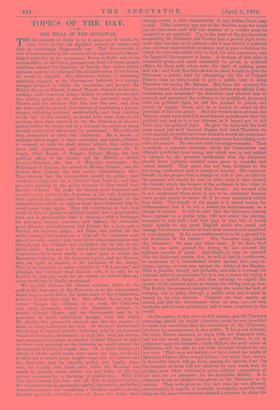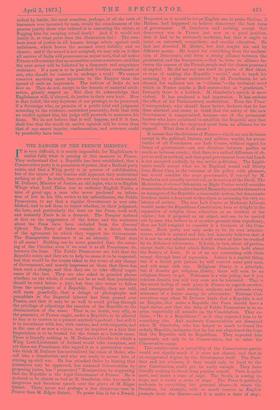TOPICS OF THE DAY.
THE TRIAL OF THE GUICOWAR.
THE Government of India is in a mess, out of which, we fear, there is but one dignified method of escape, and that an exceedingly disagreeable one. That Government, it will be remembered, in the exercise of its supreme and acknow- ledged authority as the paramount Power in India, and on its responsibility as the Power guaranteeing Native Princes against rebellion, warned the Guicowar of Baroda that unless within eighteen months he reformed the administration of his States, he would be deposed. The Guicowar, instead of reforming anything, engaged, as the Government believed, in a strange intrigue designed to falsify the succession, and because the British Envoy at Baroda, Colonel Phayre, objected to his pro- ceedings, endeavoured in Asiatic fashion to seduce his servants into mixing poison in his sherbet. So convinced were the Viceroy and his advisers that this was the case, and that the facts could be proved, that instead of instituting a private inquiry, collecting evidence confidentially, and then deciding on the fate of the accused, as would have been done at any previous time, they resolved to try the Guicowar in his own capital, before the world, and by a tribunal the justice of whose decision could never afterwards be questioned. This tribunal they nominated at their own discretion. By a stroke of audacity which ought to have succeeded, and which, whether it succeeds or fails, we shall always admire, they added to three able, experienced, and eminent Europeans—Sir R. Couch, Chief Justice of Bengal ; Colonel Meade, the best political officer of the South ; and Mr. Melvill, a skilled lawyer—Scindiah, the first of Mahratta sovereigns ; the Maharajah of Jeypore, the second of Hindoo Princes ; and Sir Dinkur Rao, perhaps the first native administrator alive. They decreed that the examination should be public ; they sanctioned a huge fee for a barrister from London ; and they promised pardons to the guilty servants if they would turn Queen's evidence. To make the inquiry more impartial and complete, they arrested the Guicowar in his own dominions, they searched his palace, and they sanctioned changes in the administration which to natives must have indicated that he would never reign again. They did everything, in fact, that could be done to change a political inquiry into a grand public trial, and a grand public trial it became,—with a Sovereign for prisoner, envoys, courtiers, and lackeys, for witnesses, great lawyers, administrators, and Princes for a jury, and a Viceroy for supreme judge. All India, and indeed all the world, accepted the inquiry as a trial, all the witnesses were placed on oath, regular and very bitter cross-examination was allowed, and the evidence was published day by day to the -whole world. And now it is stated that the members of the Commission have been unable to agree upon a verdict, the Europeans believing in the Guicowar's guilt, and the Natives, who are equal in number, in his innocence of the charge. That is an acquittal, or rather a verdict of "Not proven," and although the Viceroy's final decision will, it is said, be in London by this day week, we are unable to believe that any other award can be finally proclaimed.
We say this without the faintest reference either to the guilt or the innocence of the Guicowar, or to the consequences which may or must follow the break-down of the Commission, however serious they may be. The official theory may be correct though the evidence is so weak, the Guicowar may have personally bribed the Residency servants to murder Colonel Phayre, and the Government may be in possession of proofs indefinitely stronger than any which Mr. Scoble, the prosecutor selected, was able, for reasons of State, to bring forward at the trial. Or Serjeant Ballantine's theory may be correct, and the Guicowar may be an innocent victim of intriguers, determined to pull him from his throne, and unscrupulous enough to sacrifice Colonel Phayre in order to throw such suspicion on the Guicowar as would compel the Government of India to depose him. Or a third theory—to which, if all the native jurors have gone one way, we should be disposed to attach great weight—may also be correct, and the Guicowar may be morally guilty, but legally inno- cent, he having only stood aside while the Resident was struck by persons whose motive was not policy at all, but private vengeance for a discharge of public duty. With all that the Guicowar has done and all that is imputed to him, the statement that be personally cajoled, threatened, and bribed domestic servants into murdering a Resident, makes a strong demand upon the credulity even of those who know what
strange scenes a close examination of any Indian Court may reveal. Take, however, any one of the theories, even the worst fer the Guicowar, and still the absence of a verdict must be accepted as an acquittal. Up to the issue of the proclamation suspending the Guicowar, the Viceroy had a perfect right to in- quire into the case as he pleased—for it was strictly a political one—to trust unproducible evidence, and to give a decision for which he was responsible only to God, his own conscience, and the Imperial Government at home. A decision of that kind is.
constantly given, and must constantly be given, in political affairs, by those with whom rests the right of making peace-
and war; and Lord Northbrook was no more bound to give the- Guicowar a public trial for attempting the life of Colonel Phayre, than we were bound to give a public trial to King Theodore for seizing Mr. Rassam. But from the moment the Viceroy issued his orders for an inquiry before non-official Com- missioners, and suspended the Guicowar, and allowed fees to. counsel, and permitted the evidence to be published, he parted_ with his political right, he left the accused to justice, and justice in regular forms, and he is bound to stand by the principle of his own policy. Had the verdict been adverse, the Viceroy would have inflicted some heavier punishment than the political one and as it is not adverse, he is bound not to fall, back upon his political right. He gave the trial, and the trial must stand, just as if General Napier had tried Theodore by court-martial, he would have been bound to accept the court-mar- tial's acquittal. That the Guicowar misgoverns has nothing to do. with the matter. He was not tried for misgovernment. That is entirely a separate question, which the Commission was officially precluded from trying, and which was, in fact, settled. in advance by the previous notification that the Guicowar should have eighteen months' more grace to consider and, reform himself. That grace has not been forfeited by his not being condemned upon a charge of murder. The immense benefit to the people from a change of rule is just as little to the purpose, and would be just as little even if they desired: the benefit, which the balance of the evidence, in the cities at all events, tends to show that they do not. An accused who• is not condemned when tried, is not to be sentenced because other people would be better off if he were restrained within four walls. The benefit of the people is a sound reason for dethronement, but it is not a reason for dethronement on a charge of murder. It will be said that the Guicowar, having, been exposed to a public trial, will not retain the prestige necessary to rule well ; and that may be true, but it would apply equally to any great English noble who could not manage his tenants because he had been accused and acquitted. of card-sharping. Is his non-condemnation to be a ground for the forfeiture of his estates ? The Guicowar may punish. the witnesses ? So may any other man. If he does, that will be one more ground for saying he has misused his eighteen months of grace. And finally, it may be asserted that the Guicowar, certain that he will at last be overthrown, or suspicious of a foreordained decree against him, may in- trigue, agitate, or even arm against the safety of the Empire_ That is possible, though not probable, and that is a reason for extreme military precautions, but it is not a reason for trying a man on a capital charge, and then refusing to regard the doubts of the selected jurors as reasons for letting him go free. The British Government accepted before the world the task of carrying out a policy through a public trial, and it must be bound by its own election. Consider the trial merely an award, and still the Government chose its own case, its own methods, and its own arbitrators, and it must acquiesce in the
result. •
On the justice of this view we feel certain, and the Viceroy's reasoning, should he decide otherwise, must be very powerful to shake our conviction that the restoration of the Guicowar, whatever its consequences, is also politic. If he is not restored, the three Native assessors, to begin with, are disgraced men, and we can never again summon a native Prince to sit in judgment upon his brethren ; while Holkar, the most astute of Mahrattas, will be able to ask with triumph whether he was not wise. That may not matter, we have risked the wrath of Mahratta Princes often enough before ; but what does matter is the belief which will go forth among the natives Viet the Government of India will not abide by its own word, that its pledges, even when voluntarily given, without compulsion of any sort, are no guarantee for its inviolable fidelity. It is nonsense to say no pledges were given to the Guicowar or to opinion. They were given in the fact that he was allowed, unnecessarily, it may be, or foolishly, or stupidly, a public trial. Suppose the same Government allowed a prisoner to claim the
ordeal by battle, the most senseless, perhaps, of all the tests of innocence ever invented by man, would the senselessness of the process justify those who ordered it in executing the victor, or flogging him for escaping actual death? And if it would not justify it, at what point does the illustration fail ? The com- mon sense of justice in all human beings rebels against such unfairness, which leaves the accused every liability and no chance ; and if the award is not accepted, we may rely on it that all natives of India will pronounce us unjust men, that all native Princes will consider that an accusation means a sentence, and that the next arrest will be followed by a desperate and sanguinary resistance. If a man is to be punished whether condemned or not, why should he consent to undergo a trial? We cannot conceive anything more injurious to the Empire than the spread of such an impression. The natives of India do not love us. They do not, except in the domain of material civili- sation, greatly respect us. But they do acknowledge that Englishmen will, if obeyed, do justice to their own hurt. How is that belief, the very keystone of our prestige, to be preserved, if a Sovereign who, on promise of a public trial and judgment according to the evidence, surrenders peaceably, finds that with no verdict against him his judge still proceeds to announce his doom. We do not believe that it will happen, and if it does, shall fear that the result on native opinion will be worse than that of any secret inquiry, condemnation, and sentence could by possibility have been.



































 Previous page
Previous page